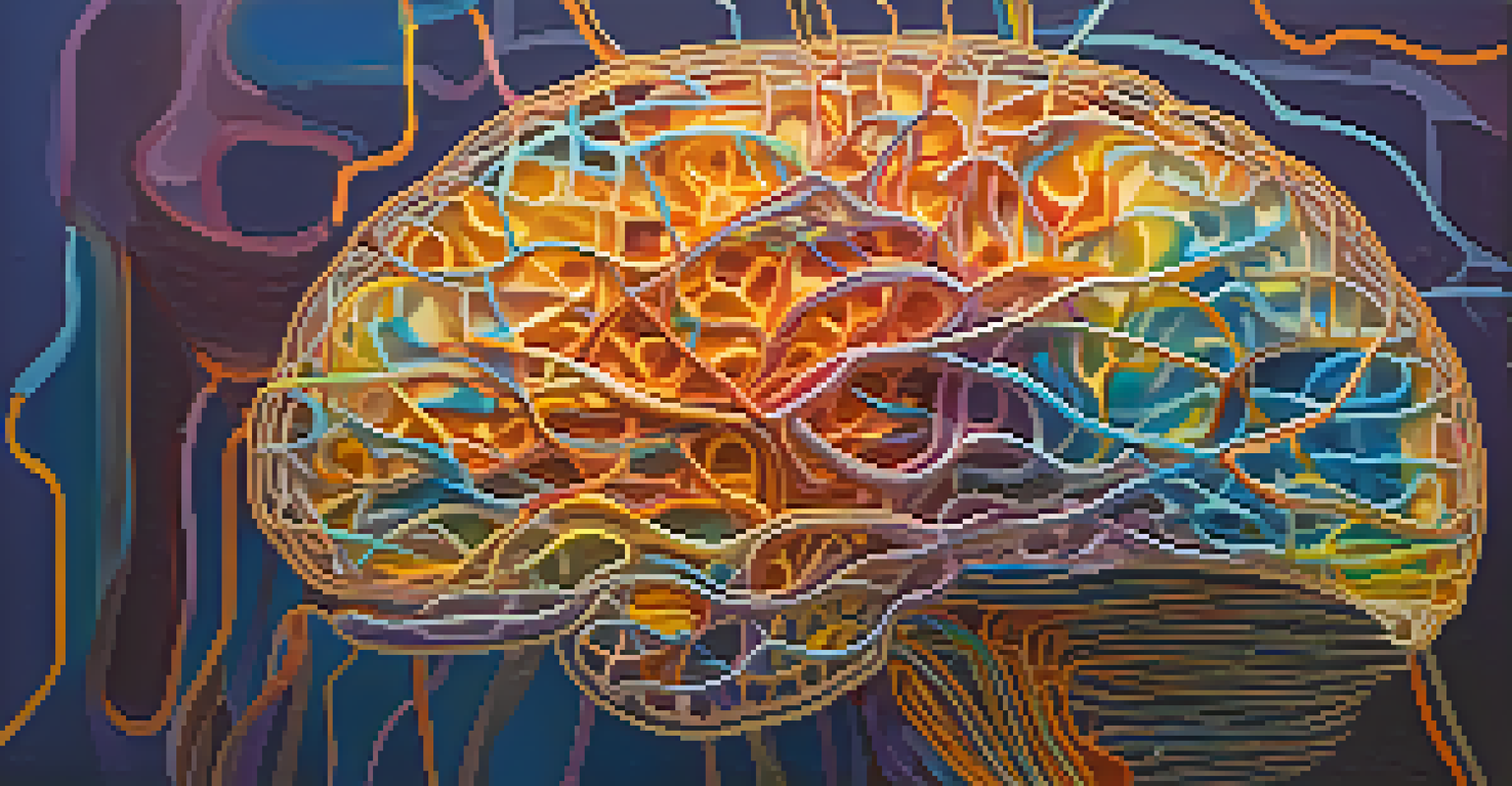Therapeutic Potential of Hallucinogens in Mental Health

Understanding Hallucinogens and Their Historical Use
Hallucinogens, often referred to as psychedelics, are substances that alter perception, mood, and cognitive processes. Historically, these substances have been utilized in various cultures for spiritual and healing purposes, dating back thousands of years. From the traditional use of peyote by Native Americans to the ancient rituals involving psilocybin mushrooms, these compounds have played significant roles in mental wellness.
Psychedelics offer a glimpse into the nature of consciousness and give us the ability to re-examine our beliefs and assumptions about ourselves and the world around us.
In recent decades, the study of hallucinogens has resurfaced, especially as researchers explore their effects on mental health disorders like depression and PTSD. This renewed interest has sparked conversations about their therapeutic potential, challenging long-held stigmas. As science progresses, we are beginning to understand how these substances can contribute to psychological healing.
Understanding the historical context helps in appreciating the current research landscape. By examining past uses alongside modern scientific inquiry, we can form a more comprehensive view of how hallucinogens might be integrated into contemporary mental health treatments.
The Science Behind Hallucinogens and the Brain
Hallucinogens primarily affect serotonin receptors in the brain, particularly the 5-HT2A receptor, which plays a crucial role in mood regulation and perception. When these receptors are activated by substances like psilocybin or LSD, users often experience altered states of consciousness, leading to profound insights and emotional breakthroughs. This mechanism is what researchers believe can help alleviate symptoms of certain mental health conditions.

Studies have shown that hallucinogens may promote neuroplasticity, which is the brain's ability to reorganize itself by forming new neural connections. This can be particularly beneficial for individuals suffering from conditions such as depression, where old thought patterns may contribute to persistent negativity. By encouraging new ways of thinking, hallucinogens can help break the cycle of despair.
Hallucinogens Aid Mental Health
Recent research highlights the potential of hallucinogens like psilocybin and MDMA in treating mental health disorders such as depression and PTSD.
Moreover, the experience of a psychedelic trip often leads to feelings of interconnectedness and transcendence, which can help individuals gain perspective on their issues. This shift in worldview can foster a sense of hope and healing, making it a valuable component in therapeutic settings.
Current Research on Hallucinogens in Mental Health
Recent clinical trials have shown promising results for the use of hallucinogens in treating mental health disorders. For instance, studies involving psilocybin have indicated significant reductions in depression and anxiety among patients with terminal illnesses. Participants often report lasting improvements in mood and outlook following just a few guided sessions.
The potential of psychedelics to treat mental health issues is not just a medical issue, it's a moral issue, as it gives us the chance to alleviate suffering.
Another area of interest is the use of MDMA in treating PTSD. Research has demonstrated that when combined with psychotherapy, MDMA can help patients process traumatic memories without becoming overwhelmed. This approach highlights how hallucinogens can enhance therapeutic experiences rather than replace traditional treatments.
As more studies emerge, the potential for hallucinogens to play a role in mental health treatment continues to expand. However, it's essential to approach this research with caution and a commitment to safety, ensuring that these substances are used responsibly and ethically.
Therapeutic Benefits of Hallucinogens
One of the main therapeutic benefits of hallucinogens is their ability to induce profound emotional experiences. Many users report feelings of deep connection, both to themselves and the world around them. This emotional release can be particularly beneficial for individuals who have struggled with trauma or emotional numbness, allowing them to access feelings they may have buried.
Additionally, hallucinogens are often associated with increased creativity and problem-solving abilities. This aspect can be harnessed in therapy to encourage patients to think outside the box and explore unconventional solutions to their challenges. By shifting their perspective, individuals may discover new paths to healing and personal growth.
Integration Enhances Therapy
The integration process post-psychedelic experience is crucial for individuals to make sense of their insights and apply them to daily life.
Furthermore, the experience of taking hallucinogens in a controlled, therapeutic setting can foster a sense of community and support. Guided sessions with trained professionals can create a safe space for exploration, allowing participants to share their experiences and insights, which can further enhance the healing process.
Challenges and Risks of Using Hallucinogens
Despite the promising research, there are challenges and risks associated with using hallucinogens for therapeutic purposes. One significant concern is the potential for adverse psychological reactions, particularly in individuals with a history of mental health issues. A 'bad trip' can lead to anxiety, paranoia, and even long-term psychological distress if not properly managed.
Additionally, the legal status of many hallucinogens complicates their use in clinical settings. While some substances like psilocybin are gaining acceptance, others remain illegal, limiting research opportunities and access to treatment. This legal ambiguity can create barriers for patients seeking alternative therapies.
It's also crucial to consider the importance of set and setting when using hallucinogens. The environment in which the substances are consumed, along with the mindset of the individual, can greatly influence the experience. Proper guidance and preparation are essential to mitigate risks and maximize therapeutic benefits.
The Role of Integration in Psychedelic Therapy
Integration is a vital component of psychedelic therapy, referring to the process of making sense of and incorporating the insights gained from a hallucinogenic experience into everyday life. After a psychedelic session, individuals often need support to reflect on their experiences and apply their newfound perspectives. This step is crucial for ensuring lasting change.
Therapists play a pivotal role in this integration process, helping clients unpack their experiences and identify actionable steps moving forward. This might include developing new coping strategies or altering negative thought patterns that were identified during the experience. Integration can also foster a sense of accountability, encouraging individuals to commit to their personal growth.
Future of Psychedelics Looks Bright
With growing public acceptance and ongoing research, hallucinogens may soon become valuable tools in mental health treatment.
Without proper integration, the insights gained during a psychedelic experience may fade, leaving individuals feeling lost or confused. Therefore, establishing a robust integration framework is essential for maximizing the therapeutic potential of hallucinogens.
Looking Forward: The Future of Hallucinogens in Mental Health
As research continues to uncover the benefits of hallucinogens for mental health, the future looks promising. There is a growing movement advocating for the decriminalization and medical use of these substances, paving the way for more extensive clinical studies. This shift could lead to new treatment options for individuals who have struggled to find relief through traditional therapies.
Moreover, as public perception shifts and stigma diminishes, more people are becoming open to exploring psychedelics as a legitimate form of treatment. This cultural change is vital in creating a supportive environment for individuals seeking help and for therapists willing to incorporate these methods into their practice.

Ultimately, the future of hallucinogens in mental health will depend on continued research, responsible use, and a commitment to patient safety. With the right approach, these substances could become valuable tools in our mental health toolkit, offering hope to those in need.